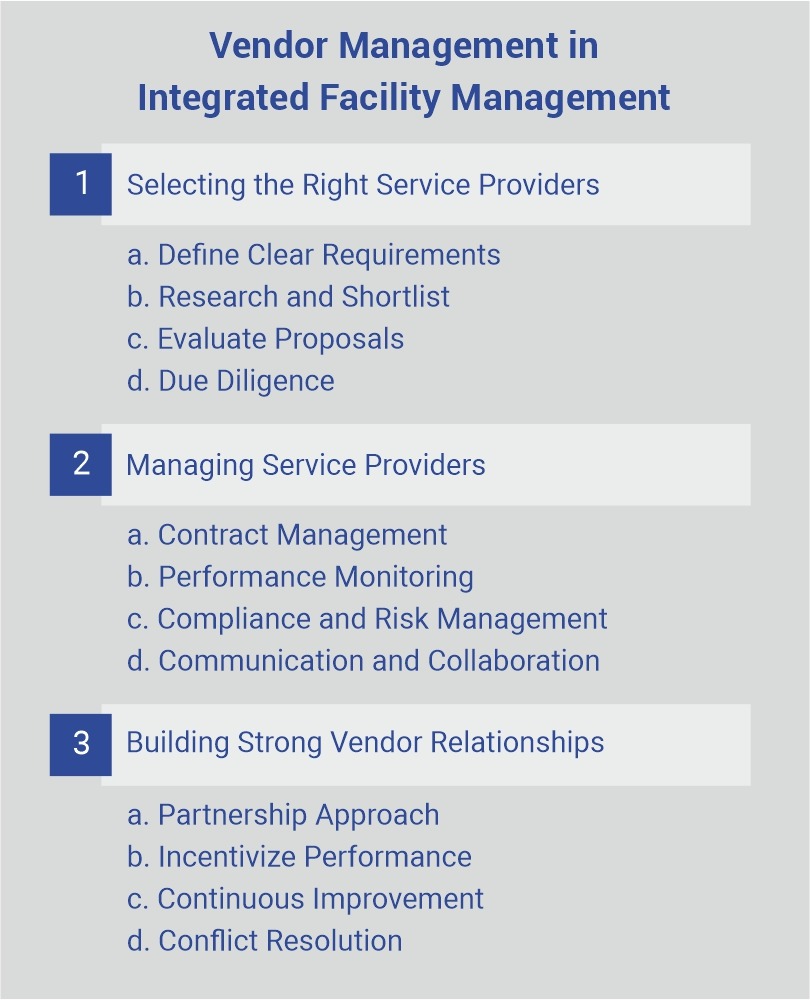
In Integrated Facility Management (IFM), where the seamless operation of services like housekeeping, maintenance, security, and more is crucial to a company's success, effective vendor management stands as a cornerstone. Vendors play a pivotal role in delivering the various services that keep facilities running smoothly, making the selection, management, and relationship-building with these service providers essential for achieving operational excellence.
The Importance of Vendor Management in IFM
Vendor management is more than just hiring external service providers. It involves a strategic approach to selecting the right partners, managing ongoing relationships, and ensuring that the services provided align with the organization's goals and standards. In IFM, where multiple vendors might be responsible for different facets of facility management, effective vendor management ensures that these providers work in harmony to deliver an integrated and efficient service.
Selecting the Right Service Providers
The process of selecting vendors is the foundation of successful vendor management. The right selection can lead to long-term partnerships that drive value, while a poor choice can result in operational disruptions, increased costs, and compromised service quality. Here’s how to approach the selection process:
1. Define Clear Requirements:
Before approaching potential vendors, it's crucial to have a clear understanding of your facility’s needs. This includes specifying the services required, the expected level of quality, compliance standards, and any specific industry-related requirements. A well-defined scope of work helps in identifying vendors who can meet your needs.
2. Research and Shortlist:
Once the requirements are clear, the next step is to research potential vendors. Look for those with a proven track record in the services you require. Industry reputation, client testimonials, and certifications can be good indicators of a vendor's capability. Shortlist vendors who not only meet your criteria but also align with your company’s values and culture.
3. Evaluate Proposals:
After shortlisting, request proposals from these vendors. Evaluate these proposals based on various factors like cost, quality of service, compliance with standards, and the ability to scale services as your needs grow. It’s important to look beyond the price and consider the long-term value that a vendor can bring to your operations.
4. Due Diligence:
Before finalizing any vendor, conduct a thorough due diligence process. This includes background checks, verifying references, and possibly conducting site visits to see the vendor’s operations firsthand. Due diligence helps in ensuring that the vendor has the capacity and reliability to deliver the services as promised.
Managing Service Providers
Once vendors are onboarded, the focus shifts to managing these relationships effectively to ensure continuous service delivery. Effective vendor management involves monitoring performance, ensuring compliance, and fostering communication.
1. Contract Management:
Clear and comprehensive contracts are essential in vendor management. These contracts should outline the scope of work, performance metrics, compliance requirements, and penalties for non-compliance. Regular reviews of the contract terms ensure that the vendor’s performance is aligned with your expectations.
2. Performance Monitoring:
Establish key performance indicators (KPIs) to monitor the vendor’s performance. Regular performance reviews based on these KPIs help in identifying areas of improvement and ensuring that the service level remains consistent. Performance monitoring should be a collaborative process, where feedback is shared constructively to enhance service delivery.
3. Compliance and Risk Management:
Compliance with industry standards and regulations is critical in IFM. Regular audits and compliance checks should be conducted to ensure that vendors adhere to these standards. Risk management is another important aspect, where potential risks related to vendor operations are identified and mitigated proactively.
4. Communication and Collaboration:
Open and transparent communication is key to successful vendor management. Regular meetings, feedback sessions, and updates ensure that both parties are on the same page. Encouraging collaboration between different vendors can also lead to improved service integration and efficiency.
Building Strong Vendor Relationships
Beyond managing vendors, it’s crucial to build strong, long-term relationships that are based on mutual trust and respect. These relationships can lead to better service delivery, cost savings, and innovation.
1. Partnership Approach:
Treating vendors as partners rather than just service providers fosters a sense of ownership and accountability. A partnership approach encourages vendors to go the extra mile to meet your needs and suggests that both parties are invested in each other's success.
2. Incentivize Performance:
Incentives can be a powerful tool in vendor management. Offering performance-based incentives not only motivates vendors to meet and exceed expectations but also strengthens the relationship by aligning their goals with yours.
3. Continuous Improvement:
Encourage vendors to innovate and continuously improve their services. Regularly review the services provided and work together on finding ways to enhance efficiency, reduce costs, or introduce new technologies. A culture of continuous improvement benefits both parties and leads to sustained success.
4. Conflict Resolution:
Disputes or issues may arise during the relationship. Having a clear process for conflict resolution helps in addressing these issues promptly without damaging the relationship. It's important to approach conflicts with a problem-solving mindset, focusing on finding solutions that work for both parties.
Why Work with Our Integrated Facility Management Company?
At FFServices Pvt Ltd, we understand that the strength of our vendor relationships directly impacts the quality of services we deliver to our clients. Our approach to vendor management is rooted in transparency, collaboration, and a commitment to excellence. We take pride in selecting the best vendors, managing these relationships with the utmost care, and fostering partnerships that drive mutual success.
When you choose to work with us, you’re not just getting a service provider; you’re gaining a partner dedicated to enhancing your facility’s operations through integrated solutions. Our extensive network of trusted vendors, combined with our rigorous management practices, ensures that you receive consistent, high-quality services that meet your needs. For vendors, partnering with us means joining a team that values innovation, performance, and long-term success. Together, we create a win-win scenario that benefits all stakeholders involved.
In a competitive landscape, choosing the right IFM partner can make all the difference. Let FFServices Pvt Ltd be the partner that helps you achieve your facility management goals with efficiency, reliability, and excellence. Contact us to see the difference.
Industries we serve:
Automobile | Manufacturing | Pharmaceutical | Oil and Gas | Healthcare | Ancillary | FMCG | Education | Real Estate | Commercial | Mining | Hotels
Also read: The Advantage of Facility Management That Will Transform Your Business

